Ep. 91: Benedikt Bösel – Managing Director & Proprietor of Schlossgut Alt Madlitz – Germany ||
For episode 91 of Sourcing Matters we welcome Benedikt Bösel, the Managing Director and Proprietor of Schlossgut Alt Madlitz in Brandenburg, Germany.
.
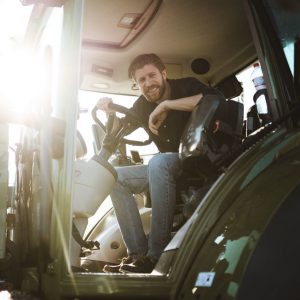 Through regenerative food production and forestry management; through hunting excursions and land stewardship initiatives; through a royal bed & breakfast and restaurant – Bösel offers patrons a unique experience dedicated to capturing and sharing the vitality found in nature’s systems. Since Benedikt has taken the reins of this 7500 acre estate located 1 hour east of Berlin – it’s become an Agtech innovation hot-bed, and an epicenter for testing / implementing Regenerative Natural Resource Management at scale.
Through regenerative food production and forestry management; through hunting excursions and land stewardship initiatives; through a royal bed & breakfast and restaurant – Bösel offers patrons a unique experience dedicated to capturing and sharing the vitality found in nature’s systems. Since Benedikt has taken the reins of this 7500 acre estate located 1 hour east of Berlin – it’s become an Agtech innovation hot-bed, and an epicenter for testing / implementing Regenerative Natural Resource Management at scale.
.
What we learn in this 45 minute discussion is that Benedikt Bösel is diversifying and innovating on his family’s iconic German estate through investing in the future. A regenerative future which marries and harmonizes with natural systems for maximum benefit to us, to the planet and to all of its co-inhabitants.
.
Joining in on the conversation is good friend of the show Renée Vassilos, a Dutch-American Agricultural Economist who has spent over fifteen years in the production agriculture space. Her work experience includes time spent with the USDA, she has started her own consultancy to help investors and Agtech companies, she spent nearly a decade with John Deere; much of that time in Beijing. Renée has recently joined The Nature Conservancy as their Agriculture Innovation Director. She’ll manage TNC’s investments in early stage agtech companies that will support regenerative agriculture production – at scale.
.
TuneIn to hear more about what regenerative really looks like. Both the opportunities and the challenges. Hear how when empowered to be better stewards of the land, we can tackle many of the biggest problems facing us in generations to come. Benedikt and Renée are our future, TuneIn to hear their positive POV on what’s in store.
.
@AltMadlitz
co-host:
Renée Vassilos
- Agricultural Economist
- The Nature Conservancy Ag Innovation Director
- past portfolio manager: Deere China
- Bilingual Dutch / American citizen
Full bio:
Renée Vassilos is a Dutch-American Agricultural Economist who has spent over fifteen years in the production agriculture space. Her work experience includes time spent with the USDA, she has started her own consultancy to help investors and Agtech companies, she spent nearly a decade with John Deere; much of that in Beijing.
Renée has recently joined The Nature Conservancy as their Agriculture Innovation Director. She will manage TNC’s investments in early stage agtech companies that will support regenerative agriculture production – at scale.


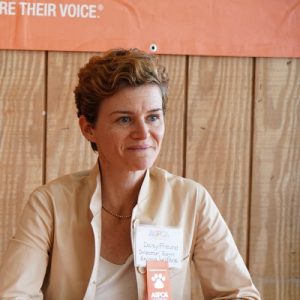 As you’ll hear, Daisy is on a mission to harmonize the interests of consumers, advocates and business through her programs. In our 40 minute conversation we learn more about how these new consumer facing platforms can be used in your day-to-day. We discover what drove the ASPCA to include farm animals in their focus – along with companion animals. We hear about Daisy’s background and influences which has lead her to tackle these big problems facing our society today. We also learn how we can take these concerns mainstream – and with what partners. And, we hear how this effort to drive change through empowerment may just be our best path forward in finding shared solutions for diverse stakeholders in food.
As you’ll hear, Daisy is on a mission to harmonize the interests of consumers, advocates and business through her programs. In our 40 minute conversation we learn more about how these new consumer facing platforms can be used in your day-to-day. We discover what drove the ASPCA to include farm animals in their focus – along with companion animals. We hear about Daisy’s background and influences which has lead her to tackle these big problems facing our society today. We also learn how we can take these concerns mainstream – and with what partners. And, we hear how this effort to drive change through empowerment may just be our best path forward in finding shared solutions for diverse stakeholders in food.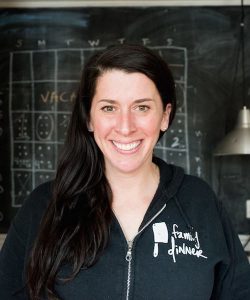 Tune in to our 45 minute discussion to hear how Erin’s background in data science is now impacting regional food sourcing, and production. In codifying a smarter supply chain and being more in-tune with the interests of a modern consumer – Family Dinner is developing scalable tech which would allow anyone to take advantage of regional assets – for anywhere. But, as we learn from Erin – you can’t fake the hard stuff. You need to get your hands dirty and develop the relationships with producers and buyers who are interested in maintaining integrity in their approaches.
Tune in to our 45 minute discussion to hear how Erin’s background in data science is now impacting regional food sourcing, and production. In codifying a smarter supply chain and being more in-tune with the interests of a modern consumer – Family Dinner is developing scalable tech which would allow anyone to take advantage of regional assets – for anywhere. But, as we learn from Erin – you can’t fake the hard stuff. You need to get your hands dirty and develop the relationships with producers and buyers who are interested in maintaining integrity in their approaches.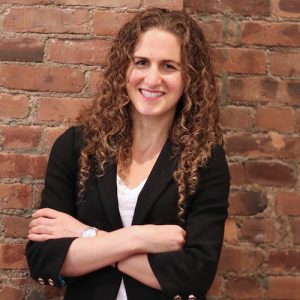 As Senior Advisor to Secretary Tom Vilsack at the U.S. Department of Agriculture, Sara Eckhouse focused on local and regional food systems, organic agriculture, and healthy food access. Sara launched and managed programs to support sustainable agriculture, and she has firsthand knowledge of the opportunities and challenges of combining sustainability with profitability in food value chains.
As Senior Advisor to Secretary Tom Vilsack at the U.S. Department of Agriculture, Sara Eckhouse focused on local and regional food systems, organic agriculture, and healthy food access. Sara launched and managed programs to support sustainable agriculture, and she has firsthand knowledge of the opportunities and challenges of combining sustainability with profitability in food value chains.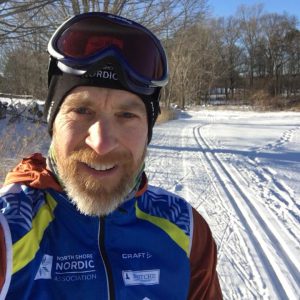 Using adaptive grazing is one important strategy to increase the soil health of our public grasslands and rangelands. For episode 85 of Sourcing Matters, consultant Greg Horner discusses his recent work interviewing innovative public land managers across the US about their use of adaptive grazing as a tool to improve soil health, restore ecosystem function, and increase biodiversity. While these agency staff are increasing soil health, they are also increasing soil carbon and making the land they manage more resilient to climate change.
Using adaptive grazing is one important strategy to increase the soil health of our public grasslands and rangelands. For episode 85 of Sourcing Matters, consultant Greg Horner discusses his recent work interviewing innovative public land managers across the US about their use of adaptive grazing as a tool to improve soil health, restore ecosystem function, and increase biodiversity. While these agency staff are increasing soil health, they are also increasing soil carbon and making the land they manage more resilient to climate change.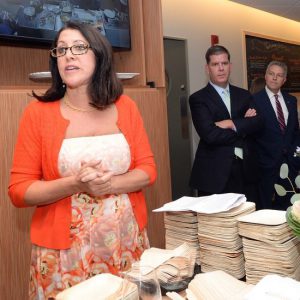 The Boston Public Market launched in 2015 as a year-round indoor market with the mission of bringing seasonal and local food to Boston’s downtown crowd. Everything sold at the market initially comes from somewhere in New England. This includes everything from seafood to ice cream and fresh produce. It is operated by the Boston Public Market Association, a nonprofit organization born from the collaboration between the city of Boston and the Commonwealth of Massachusetts.
The Boston Public Market launched in 2015 as a year-round indoor market with the mission of bringing seasonal and local food to Boston’s downtown crowd. Everything sold at the market initially comes from somewhere in New England. This includes everything from seafood to ice cream and fresh produce. It is operated by the Boston Public Market Association, a nonprofit organization born from the collaboration between the city of Boston and the Commonwealth of Massachusetts.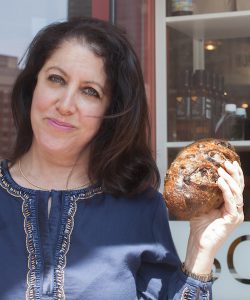
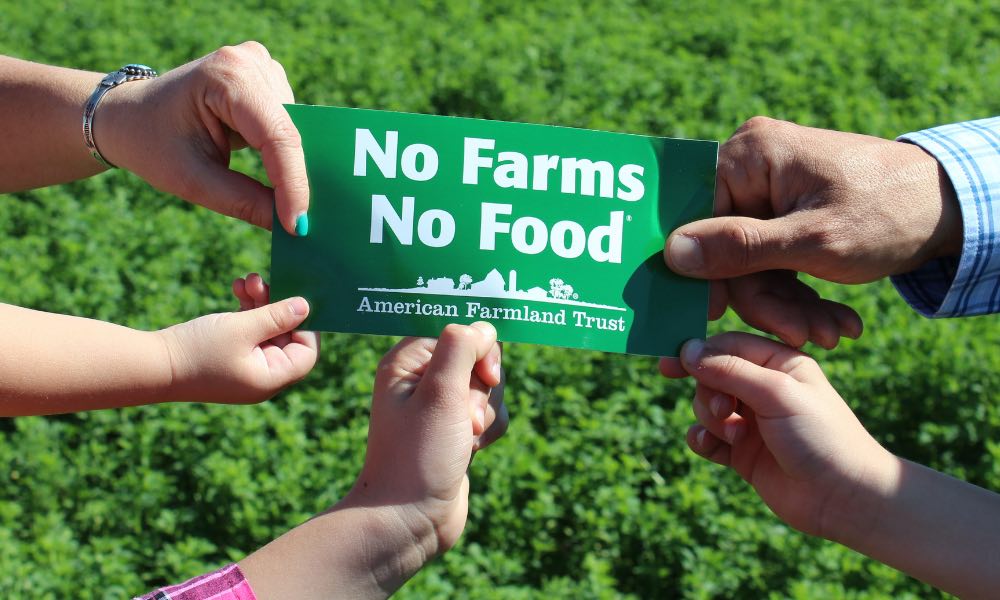
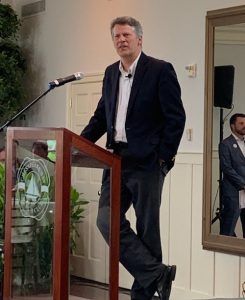 John Piotti joined American Farmland Trust as president and CEO in July 2016, bringing more than 25 years of executive management and public policy experience to the organization. Prior, John served as president and CEO of Maine Farmland Trust for 10 years. Under his leadership, Maine Farmland Trust became an award-winning statewide nonprofit organization, helping over 500 Maine farms remain viable. Piotti has earned a reputation as a nonpartisan problem-solver; as a Statesman, an Eisenhower Fellow – and – as a leader in future food that has helped stabilize a regional dairy industry, and procure funding to protect working waterfronts & our natural lands. John holds three degrees from the MIT, in engineering, public policy, and management.
John Piotti joined American Farmland Trust as president and CEO in July 2016, bringing more than 25 years of executive management and public policy experience to the organization. Prior, John served as president and CEO of Maine Farmland Trust for 10 years. Under his leadership, Maine Farmland Trust became an award-winning statewide nonprofit organization, helping over 500 Maine farms remain viable. Piotti has earned a reputation as a nonpartisan problem-solver; as a Statesman, an Eisenhower Fellow – and – as a leader in future food that has helped stabilize a regional dairy industry, and procure funding to protect working waterfronts & our natural lands. John holds three degrees from the MIT, in engineering, public policy, and management.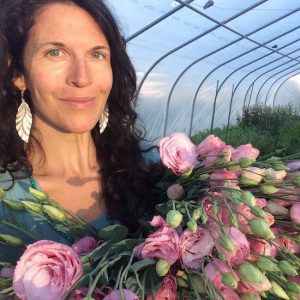 Stone Barns Center for Food and Agriculture was developed by David Rockefeller and dedicated to the memory of his wife, Peggy Rockefeller. The Stone Barns Center’s mission is to demonstrate, teach and promote sustainable, community-based food production. Open to visitors of all ages but with an emphasis on K-12 education, the Center offers a unique experience: a chance to learn about farming firsthand on a real working farm within a 30-minute drive of New York City. Livestock, chickens, vegetables, gardens, greenhouses a learning facility and cultural center demonstrate to the public the advantages of local, community-based farming and environmentally sensitive agricultural practices. The Center is also home to Blue Hill at Stone Barns, a four star restaurant that offers guests a taste of the farm and of the Hudson Valley.
Stone Barns Center for Food and Agriculture was developed by David Rockefeller and dedicated to the memory of his wife, Peggy Rockefeller. The Stone Barns Center’s mission is to demonstrate, teach and promote sustainable, community-based food production. Open to visitors of all ages but with an emphasis on K-12 education, the Center offers a unique experience: a chance to learn about farming firsthand on a real working farm within a 30-minute drive of New York City. Livestock, chickens, vegetables, gardens, greenhouses a learning facility and cultural center demonstrate to the public the advantages of local, community-based farming and environmentally sensitive agricultural practices. The Center is also home to Blue Hill at Stone Barns, a four star restaurant that offers guests a taste of the farm and of the Hudson Valley.
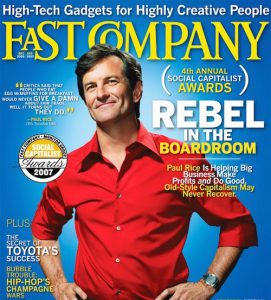 Twenty years later, Fair Trade has grown into a widely-known and increasingly mainstream consumer trend that is rapidly approaching an inflection point. In 2016, consumer recognition of the Fair Trade Certified label reached 67% and U.S. retail sales of Fair Trade products grew to an estimated $6 billion. Paul and his team have enlisted the support of over 1,300 companies, including market leaders like Green Mountain, Starbucks, Nespresso, General Mills, PepsiCo, Whole Foods, Costco, Target and Walmart. Fair Trade USA now certifies coffee, tea, cocoa, sugar, coconut, fresh fruits and vegetables. Most recently, through groundbreaking partnerships with Patagonia, West Elm and Gap Inc., Fair Trade has begun certifying apparel and home furnishings to improve working conditions and incomes for factory workers.
Twenty years later, Fair Trade has grown into a widely-known and increasingly mainstream consumer trend that is rapidly approaching an inflection point. In 2016, consumer recognition of the Fair Trade Certified label reached 67% and U.S. retail sales of Fair Trade products grew to an estimated $6 billion. Paul and his team have enlisted the support of over 1,300 companies, including market leaders like Green Mountain, Starbucks, Nespresso, General Mills, PepsiCo, Whole Foods, Costco, Target and Walmart. Fair Trade USA now certifies coffee, tea, cocoa, sugar, coconut, fresh fruits and vegetables. Most recently, through groundbreaking partnerships with Patagonia, West Elm and Gap Inc., Fair Trade has begun certifying apparel and home furnishings to improve working conditions and incomes for factory workers.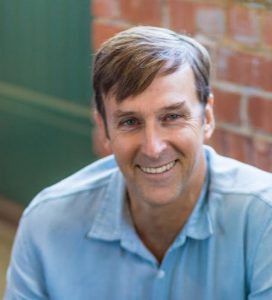 John Roulac started natural and superfoods brand Nutiva in 1999 because of his deeply held belief that it is his purpose to challenge the industrial food model and create a better food system to nourish people, communities, and our planet. Through his leadership, Nutiva has become one of the fastest-growing superfoods company in the world. Nutiva has been named one of Inc. Magazine’s fastest-growing private companies in America for seven years in a row – with sales topping $100mm in 2015.
John Roulac started natural and superfoods brand Nutiva in 1999 because of his deeply held belief that it is his purpose to challenge the industrial food model and create a better food system to nourish people, communities, and our planet. Through his leadership, Nutiva has become one of the fastest-growing superfoods company in the world. Nutiva has been named one of Inc. Magazine’s fastest-growing private companies in America for seven years in a row – with sales topping $100mm in 2015.